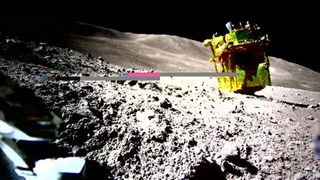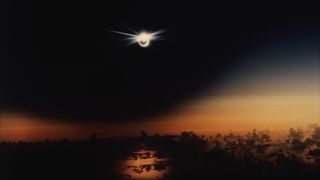
Brandon Specktor
Brandon is the space / physics editor at Live Science. With more than 20 years of editorial experience, his writing has appeared in The Washington Post, Reader's Digest, CBS.com, the Richard Dawkins Foundation website and other outlets. He holds a bachelor's degree in creative writing from the University of Arizona, with minors in journalism and media arts. His interests include black holes, asteroids and comets, and the search for extraterrestrial life.
Latest articles by Brandon Specktor
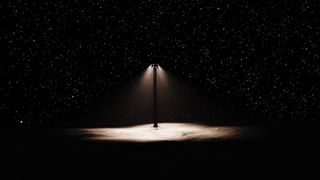
Researchers want to build 'streetlights' on the moon — and they'd be taller than the Statue of Liberty
By Brandon Specktor last updated
A private company has received funding from the U.S. government to build the first-ever "streetlights" on the moon — towering, Statue of Liberty-sized structures that could withstand the brutal lunar night.

Auroras expected tonight and through the weekend as US braces from 'cannibal' solar eruption
By Brandon Specktor last updated
A chain of solar outbursts, including a "cannibal" coronal mass ejection that slammed Earth on Tuesday, will bring lovely auroras to parts of the northern US and most of Canada this weekend. Here's where to look.

Space photo of the week: Warped 'penguin galaxy' spotted by JWST is waddling toward certain doom
By Brandon Specktor published
To mark its second anniversary of operations, James Webb Space Telescope scientists share a stunning view of the Penguin and Egg galaxies as they slowly collide.

Newly discovered asteroid larger than the Great Pyramid of Giza will zoom between Earth and the moon on Saturday
By Brandon Specktor published
On Saturday (June 29), an asteroid larger than the Great Pyramid of Giza will fly past Earth at about three-quarters the distance from Earth to the moon. The asteroid, named 2024 MK, poses no risk to our planet.

Space junk: How broken satellites are creating a garbage crisis in the sky
By Brandon Specktor last updated
Thousands of pieces of space debris, also known as space junk, are orbiting Earth, with tons more added each year. This orbital debris poses a significant threat to satellites, spacecraft, astronauts — and increasingly humans on Earth.
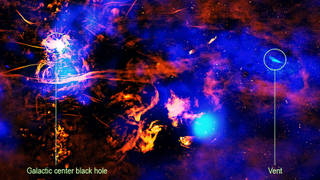
Milky Way's black hole 'exhaust vent' discovered in eerie X-ray observations
By Brandon Specktor published
A gargantuan "exhaust vent" may be channeling hot gas away from the Milky Way's supermassive black hole at millions of miles per hour — and filling up two enormous bubbles that tower over the galaxy.

James Webb telescope spots a dozen newborn stars spewing gas in the same direction — and nobody is sure why
By Brandon Specktor published
The James Webb telescope has spotted a peculiar group of baby stars firing enormous jets into space at nearly the exact same angle. The discovery could hold new insights into how stars are born.
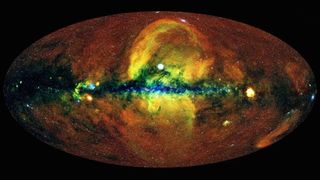
5 space discoveries that scientists are struggling to explain
By Brandon Specktor published
From "runaway" black holes shooting across the cosmos to secret planets in our own backyard, space is overrun with mysterious objects that scientists are clamoring to explain. Here are five of the strangest sights in the universe, as well as their possible origins.

LIFTOFF! Boeing Starliner carries 2 astronauts to space in 'final test' for NASA (watch live)
By Brandon Specktor published
Boeing's Starliner spacecraft successfully carried two NASA astronauts to space today (June 5) in the final test of the spacecraft's capabilities. Starliner is bound for the International Space Station.
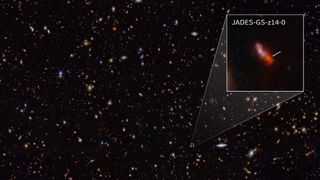
James Webb telescope discovers earliest galaxy in the known universe — and its shockingly big
By Brandon Specktor published
The James Webb Space Telescope has detected the two earliest, most distant galaxies in the known universe, dating to just 300 million years after the Big Bang. The detection of even earlier galaxies is likely to follow.

James Webb telescope sees 'birth' of 3 of the universe's earliest galaxies in world-1st observations
By Brandon Specktor published
The James Webb Space Telescope may have spotted the birth of some of the earliest galaxies in the universe for the first time ever, new research hints.

32 stunning photos of auroras seen from space
By Brandon Specktor published
Auroras (also called the northern and southern lights) are visible from the ground after powerful solar storms, but these natural light shows look even more majestic from above. Here are 32 spectacular photos of auroras taken from space.
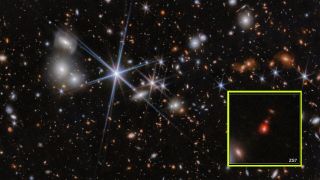
James Webb telescope spots 2 monster black holes merging at the dawn of time, challenging our understanding of the universe
By Brandon Specktor published
New observations with the James Webb Space Telescope reveal the most distant pair of merging black holes ever spotted. The discovery further challenges leading theories of cosmology.
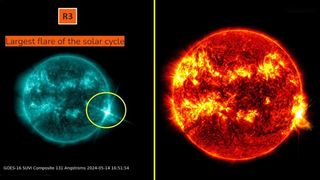
Sun launches strongest solar flare of current cycle in monster X8.7-class eruption
By Brandon Specktor published
The strongest solar flare in half a decade just launched off the sun from the same sunspot group that triggered dazzling auroras last weekend. But don't expect northern lights this time around.

Space photo of the week: A planet-size explosion rocks the sun's 'mossy' corona
By Brandon Specktor published
Coronal moss grows, solar rain falls and plasma eruptions rear their gargantuan heads in this fiery landscape of the sun's outer atmosphere, taken by ESA's Solar Orbiter.

No, the James Webb Space Telescope probably didn't detect signs of alien life — but it soon could
By Brandon Specktor published
The James Webb Space Telescope's possible detection of biological chemicals on the exoplanet K2-18b may just have been methane gas, a new study cautions. Planned follow-up observations could solve the mystery for good.

Space photo of the week: NASA spots enormous pink 'flames' during total solar eclipse. What are they?
By Brandon Specktor published
Fiery pink towers could be seen erupting from the sun during the total solar eclipse on April 8. What are they?

Why I watched the solar eclipse with my kids, a goose and 2,000 trees
By Brandon Specktor published
A solar eclipse viewing party at Canada's Royal Botanical Gardens peaked with a 90-second totality that blew minds and moved hearts. Also, there were geese.

Where to get solar eclipse glasses last minute
By Brandon Specktor published
It may not be too late to get last minute solar eclipse glasses for today, depending on your location.
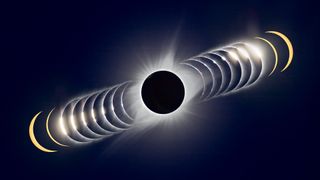
April 8 total solar eclipse: Everything you need to know
By Brandon Specktor last updated
A total solar eclipse will be visible to millions of people in North America today. Here's everything you need to know about where, when, and how to view the 2024 solar eclipse.
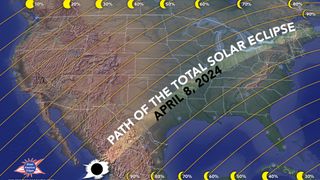
2024 solar eclipse map: Where to see the eclipse on April 8
By Brandon Specktor published
These 2024 solar eclipse maps will help you make the best decision about where and how to watch the total solar eclipse on Monday (April 8).

13 billion-year-old 'streams of stars' discovered near Milky Way's center may be earliest building blocks of our galaxy
By Brandon Specktor published
Two gargantuan structures discovered near our galaxy's ancient heart may be some of the earliest building blocks of the Milky Way. Researchers have named them Shiva and Shakti.

Spring equinox 2024: 'Equal night' brings the first full day of spring to the Northern Hemisphere
By Brandon Specktor last updated
The Spring equinox (March 19, 2024) signals the start of spring in the Northern Hemisphere, the beginning of autumn in the Southern Hemisphere, and a rare moment of "equal night" across the world.
Get the world’s most fascinating discoveries delivered straight to your inbox.
